April 12, 2017 •
Wednesday’s Government Relations and Ethics News
Lobbying Missouri: “Limit on Lobbyist Gifts Clears Missouri Senate Committee” by Jason Hancock for Kansas City Star Campaign Finance California: “Anti-Pot Group Faces Campaign Finance Violations from Its Work Opposing Marijuana Legalization in California” by Patrick McGreevy for Los Angeles […]
 Lobbying
Lobbying
Missouri: “Limit on Lobbyist Gifts Clears Missouri Senate Committee” by Jason Hancock for Kansas City Star
Campaign Finance
California: “Anti-Pot Group Faces Campaign Finance Violations from Its Work Opposing Marijuana Legalization in California” by Patrick McGreevy for Los Angeles Times
New York: “Investigations into De Blasio Spurred City Reform, Renewed Calls for State Changes” by Samar Khurshid for Gotham Gazette
Ethics
“Secret A.T.F. Account Paid for $21,000 Nascar Suite and Las Vegas Trip” by Matt Apuzzo for New York Times
Michigan: “Michigan Sen. Bert Johnson Indicted by Grand Jury” by Paul Egan and Kathleen Gray for Detroit Free Press
South Carolina: “New SC Ethics Law Does Not Go Far Enough, Critics Say” by Avery Wilks for The State
Elections
Texas: “Federal Judge Says Texas Voter ID Law Intentionally Discriminates” by Manny Fernandez for New York Times
Legislative Issues
Oklahoma: “LGBTQ Group’s Capitol Visit Prompts Mass Email About ‘Cross-Dressers in the Building’” by Randy Krehbiel for Tulsa World
Procurement
California: “Feds: Well-known Oakland contractors conspired to cheat government” by Malaika Fraley for East Bay Times
April 7, 2017 •
Governor Signs Bill Modernizing Colorado Procurement Code
Gov. Hickenlooper recently signed House Bill 17-1051, modernizing the Colorado Procurement Code. Among other changes, the bill exempts grants from the state bidding requirements and makes the Procurement Code of Ethics and Guidelines applicable to state procurement officials, end users, […]
 Gov. Hickenlooper recently signed House Bill 17-1051, modernizing the Colorado Procurement Code.
Gov. Hickenlooper recently signed House Bill 17-1051, modernizing the Colorado Procurement Code.
Among other changes, the bill exempts grants from the state bidding requirements and makes the Procurement Code of Ethics and Guidelines applicable to state procurement officials, end users, vendors, contractors, and interested third parties.
If the Legislature adjourns sine die on May 10, 2017, the bill will be effective August 9.
Photo of Gov. Hickenlooper By U.S. Department of Agriculture via Wikimedia Commons
March 10, 2017 •
GAO Report on Federal Contracting Trends
On March 9, the United States Government Accountability Office (GAO) issued an analysis of federal contracting trends to Congress. The report, titled Contracting Data Analysis: Assessment of Government-wide Trends, identified overall trends in contract obligations of defense and civilian agencies […]
 On March 9, the United States Government Accountability Office (GAO) issued an analysis of federal contracting trends to Congress. The report, titled Contracting Data Analysis: Assessment of Government-wide Trends, identified overall trends in contract obligations of defense and civilian agencies from fiscal year 2011 to 2015 using data from the Federal Procurement Data System-Next Generation.
On March 9, the United States Government Accountability Office (GAO) issued an analysis of federal contracting trends to Congress. The report, titled Contracting Data Analysis: Assessment of Government-wide Trends, identified overall trends in contract obligations of defense and civilian agencies from fiscal year 2011 to 2015 using data from the Federal Procurement Data System-Next Generation.
The report states defense obligations to purchase goods and services decreased by over 30 percent while civilian obligations remained steady, as did the percentage of total obligations reported for competitive contracts. During this period, fixed price contracts were used for an average of 63 percent of obligations.
The GAO did not make any new recommendations in the report, but did highlight previous recommendations made to defense and civilian agencies. The report asserts the agencies “generally concurred with these recommendations and have taken or planned actions to address them.”
February 21, 2017 •
Tuesday’s Government Relations and Ethics News
Campaign Finance ‘Soft Money’ Case a Test for Trump, Supreme Court by Kenneth Doyle for Bloomberg BNA Missouri: Amid Greitens Mystery, Missouri Democrats Revive Inauguration Funding Disclosure Bill by Jason Hancock for Kansas City Star Ethics Americans Are Seriously Stressed […]
 Campaign Finance
Campaign Finance
‘Soft Money’ Case a Test for Trump, Supreme Court by Kenneth Doyle for Bloomberg BNA
Missouri: Amid Greitens Mystery, Missouri Democrats Revive Inauguration Funding Disclosure Bill by Jason Hancock for Kansas City Star
Ethics
Americans Are Seriously Stressed Out About the Future of the Country, Survey Finds by Colby Itkowitz for The Washington Post
Democratic Party Chairs Struggle to Harness Activism Burst by Heidi Przybyla and Fredreka Schouten for USA Today
New Jersey: Judge: Bridge case complaint against Christie can proceed by David Porter (Associated Press) for ABC News
Pennsylvania: Closer Monitoring on Tap for City Council’s Ethics Training by Julia Terruso for Philadelphia Inquirer
South Carolina: SC Government Watchdog Crangle Takes New Post but Will Still Be Working General Assembly by John Monk for The State
Texas: Texas May Still Be Giving State-Funded Pension to Convicted Elected Officials by Jackie Wang for Texas Tribune
Lobbying
Hawaii: Tightening The Rules for Lobbyists by Ian Lind for Honolulu Civil Beat
Procurement
Arizona: Rival Sues Taser Over Loss of Phoenix Police Body-Cam Contract by Megan Cassidy for Arizona Republic
February 2, 2017 •
Thursday’s Government Relations and Ethics News
Lobbying Arizona: “How The Wrong Letterhead Exposed Phoenix’s Toothless Lobbying Rules” by Rob O’Dell and Dustin Gardner for Arizona Republic Arkansas: “Bill Would Let Foreigners Foot Bill for Some Lawmaker Travel” by Michael Wickline for Arkansas Online Campaign Finance South […]
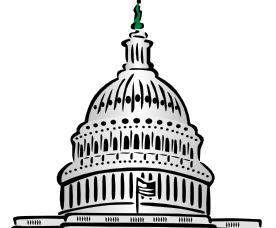 Lobbying
Lobbying
Arizona: “How The Wrong Letterhead Exposed Phoenix’s Toothless Lobbying Rules” by Rob O’Dell and Dustin Gardner for Arizona Republic
Arkansas: “Bill Would Let Foreigners Foot Bill for Some Lawmaker Travel” by Michael Wickline for Arkansas Online
Campaign Finance
South Carolina: “Upstate’s Judge’s Race Raises Judicial Ethics Question” by John Monk for The State
Washington: “Seattle Candidates Already on Hunt for ‘Democracy Vouchers’” by Daniel Beekman for Seattle Times
Ethics
“Trump Aide’s Deal with Chinese Firm Raises Fear of Tangled Interests” by Sharon LaFraniere, Michael Forsythe, and Alexandra Stevenson for New York Times
“Resistance from Within: Federal workers push back against Trump” by Juliet Eilperin, Lisa Rein, and Marc Fisher for Washington Post
Montana: “Campaign Regulator Can Remain Until Replacement Is Confirmed” by Matt Volz (Associated Press) for McClatchyDC.com
South Dakota: “South Dakota Senate Sends Ethics Law Repeal to Governor” by James Nord for Associated Press
West Virginia: “Potential Conflicts Also Issue for New WV Commerce Secretary” by Andrew Brown for Charleston Gazette
Elections
“Trump Rattles Statehouse Order” by David Siders for Politico
Procurement
“White House Says LGBT Protections for Federal Workers Will Remain” by Juliet Eilperin and Sandhya Somashekhar for Washington Post
Tech and Social Media
“Fatigued by the News? Experts Suggest How to Adjust Your Media Diet” by Christopher Mele for New York Times
Procurement Lobbying Compliance Laws for Government Relations Professionals, focuses solely on corporate compliance related to procurement lobbying, and is of particular importance as federal, state, and local governments purchase trillions of dollars of goods and services. This online publication presents […]
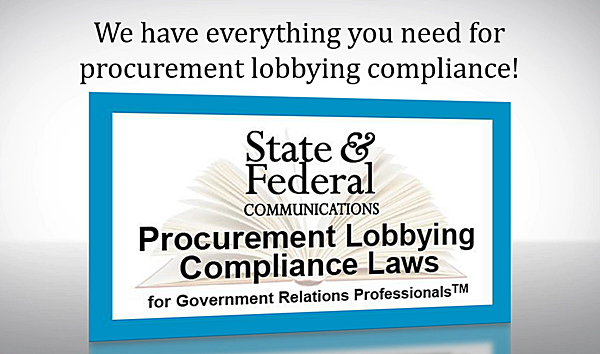 Procurement Lobbying Compliance Laws for Government Relations Professionals, focuses solely on corporate compliance related to procurement lobbying, and is of particular importance as federal, state, and local governments purchase trillions of dollars of goods and services.
Procurement Lobbying Compliance Laws for Government Relations Professionals, focuses solely on corporate compliance related to procurement lobbying, and is of particular importance as federal, state, and local governments purchase trillions of dollars of goods and services.
This online publication presents all procurement lobbying laws in the 50 states, the federal government, and more than 300 municipal jurisdictions, along with common-language descriptions of these same ordinances and statutes. It is a must-have reference for any and every company doing business with states and municipal governments.
Learn more about all of the Online Publications for Government Relations Professionals from State and Federal Communications, or try a free demo today to see all the ways this online publication can help you in your procurement efforts.
December 28, 2016 •
Wednesday Government Relations News
Lobbying Missouri: “With Greitens’ Blessing, Lawmakers Aim for Lobbyist-Gift Ban” by Summer Ballentine (Associated Press) for Springfield News-Leader New York: “Ex-Prisoners Get an Advocate from Their Own Ranks” by Benjamin Weiser for New York Times Campaign Finance “Trump Rewards Big […]
 Lobbying
Lobbying
Missouri: “With Greitens’ Blessing, Lawmakers Aim for Lobbyist-Gift Ban” by Summer Ballentine (Associated Press) for Springfield News-Leader
New York: “Ex-Prisoners Get an Advocate from Their Own Ranks” by Benjamin Weiser for New York Times
Campaign Finance
“Trump Rewards Big Donors with Jobs and Access” by Isaac Arnsdorf for Politico
Vermont: “Donovan Taking Hard Look at AG’s Campaign Finance Case” by Morgan True for VTDigger.org
Ethics
“Donald Trump Plans to Shut Down His Charitable Foundation, Which Has Been Under Scrutiny for Months” by Mark Berman and David Fahrenthold for Washington Post
California: “Santa Clara County Bosses Let Workers Take Toys Meant for Needy Kids” by Ramona Girwagis for San Jose Mercury News
Maryland: “Botsaris Appointed Executive Director of Anne Arundel County Ethics Commission” by Amanda Yeager for Capital Gazette
South Carolina: “Possibility of More S.C. Lawmakers Charged with Corruption Looms” by Seanna Adcox (Associated Press) for Aiken Standard
Elections
Oklahoma: “An Oklahoma Newspaper Endorsed Clinton. It Hasn’t Been Forgiven.” by Manny Fernandez for New York Times
Legislative Issues
“Ryan Proposes Fines, Ethics Moves on Grandstanding House Members” by Billy House for Bloomberg.com
North Carolina: “When One Party Has the Governor’s Mansion and the Other Has the Statehouse” by Trip Gabriel for New York Times
Procurement
California: “Bid-Rigging Indictment Alleges California Government Contracting Scheme” by Adam Ashton for Sacramento Bee
December 14, 2016 •
Wednesday News Roundup
Campaign Finance “Activists Brace for Fight Over Campaign Finance Law” by Alex Roarty for Roll Call Elections “Completed Wisconsin Recount Widens Donald Trump’s Lead by 131 Votes” by Matthew DeFour for Wisconsin State Journal Ethics “Aaron Schock Pleads Not Guilty […]
 Campaign Finance
Campaign Finance
“Activists Brace for Fight Over Campaign Finance Law” by Alex Roarty for Roll Call
Elections
“Completed Wisconsin Recount Widens Donald Trump’s Lead by 131 Votes” by Matthew DeFour for Wisconsin State Journal
Ethics
“Aaron Schock Pleads Not Guilty To Slew of Federal Charges” by Aryn Braun for Roll Call
Wisconsin: “State Ethics Commissioner Resigns, Citing Dysfunction in New Watchdog Agency” by Mark Sommerhauser and Molly Beck for Wisconsin State Journal
Legislative Issues
“Budget Shortfalls Expected in the Most States Since Recession” by Liz Farmer for Governing
Lobbying
“K Street Eyes Outgoing Lawmakers for Jobs” by Kate Ackley for Roll Call
“Exxon-Mobil: No Stranger to Lobbying the ‘Swamp’” by Lesley Clark (McClatchy) for The News & Observer
“Trump Transition Trade Staffer Defended NAFTA, was Chamber of Commerce Lobbyist” by Andrew Kaczynski and Chris Massie for CNN
Missouri: “Opinion: The Christmas Spirit of Lobbyists” by Phill Brooks for The Springfield Business Journal
Procurement
New York: “DiNapoli Proposes Procurement Reforms” by Matthew Hamilton for Times Union
December 8, 2016 •
Maryland to Modernize Procurement Laws
Maryland Lt. Gov. Boyd K. Rutherford, as chair of the Commission to Modernize State Procurement, released a report outlining a plan to update state procurement laws. The proposed regulations will update outdated statutory language and allow individuals to file applications […]

Maryland Lt. Gov. Boyd K. Rutherford, as chair of the Commission to Modernize State Procurement, released a report outlining a plan to update state procurement laws. The proposed regulations will update outdated statutory language and allow individuals to file applications and reports online.
Along with the report, Maryland unveiled a new procurement website, which will act as a singular procurement communications portal providing online access to procurement information. The new procurement information website can be viewed here.
November 17, 2016 •
Gov. Cuomo to Address Ethics Concerns
On November 16, 2016, Gov. Andrew Cuomo released a statement proposing plans to limit campaign contributions and close loopholes for those doing business with the state. In response to contracting scandals at state universities, Cuomo intends to appoint inspectors general […]
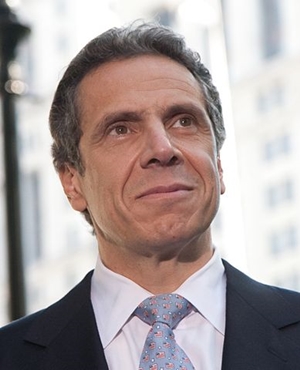 On November 16, 2016, Gov. Andrew Cuomo released a statement proposing plans to limit campaign contributions and close loopholes for those doing business with the state.
On November 16, 2016, Gov. Andrew Cuomo released a statement proposing plans to limit campaign contributions and close loopholes for those doing business with the state.
In response to contracting scandals at state universities, Cuomo intends to appoint inspectors general to investigate fraud and abuse at the State University of New York and the City University of New York.
Furthermore, Cuomo will appoint a chief procurement officer to review all state contracts and grants for the purpose of re-establishing public trust. The entire statement can be accessed here.
Photo of Governor Cuomo courtesy of Pat Arnow on Wikipedia.
November 9, 2016 •
Anne Arundel County, Maryland Keeps Competitive Bidding Amount
Residents voted against an amendment to the Anne Arundel County Charter (Question C). If passed, the ballot issue would have raised the current dollar amount of bids requiring competitive procurement for most procurement contracts from $25,000 to $75,000. Bids under […]
 Residents voted against an amendment to the Anne Arundel County Charter (Question C).
Residents voted against an amendment to the Anne Arundel County Charter (Question C).
If passed, the ballot issue would have raised the current dollar amount of bids requiring competitive procurement for most procurement contracts from $25,000 to $75,000.
Bids under $75,000 would not be required to go through full competitive bidding.
October 20, 2016 •
Dallas County, TX Approves New Purchasing Manual
County commissioners approved a new purchasing manual to ensure consistency and avoid impropriety within the county’s contracting process. A new hiring manager was brought in last year to overhaul a Purchasing Department troubled for years with allegations of political meddling. […]
 County commissioners approved a new purchasing manual to ensure consistency and avoid impropriety within the county’s contracting process.
County commissioners approved a new purchasing manual to ensure consistency and avoid impropriety within the county’s contracting process.
A new hiring manager was brought in last year to overhaul a Purchasing Department troubled for years with allegations of political meddling.
Pursuant to the new manual, the Commissioners Court will still approve contracts handled by the Purchasing Department, but will be unable to override the department’s vendor choices. These changes are the latest in a series of improvements following the federal indictment of a county commissioner for rigging bids and accepting kickbacks in 2014.
October 14, 2016 •
Do You Have Questions about Pay-to-Play and the Procurement Process?
Most of us have an idea of what lobbying is, but as states expand the definitions of lobbying, more activities may now trigger registration and reporting requirements. And, as states tighten political contribution rules, more and more contractors may run […]
Most of us have an idea of what lobbying is, but as states expand the definitions of lobbying, more activities may now trigger registration and reporting requirements. And, as states tighten political contribution rules, more and more contractors may run into problems because of pay-to-play laws. But in order to comply with the rules, you need to know the rules.
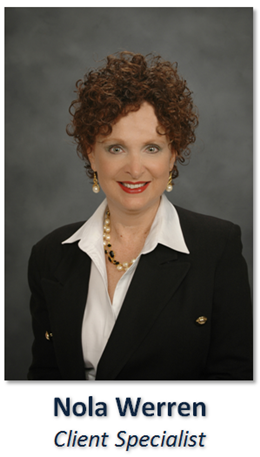 State and Federal Communications is taking part in two events over the next few weeks looking specifically at these issues. This fall our Compliance Client Specialist Nola Werren, Esq., will present “Compliance: Pay-to-Play and Procurement Lobbying Process” at events with the Public Affairs Council and WASRG, the Washington Area State Relations Group.
State and Federal Communications is taking part in two events over the next few weeks looking specifically at these issues. This fall our Compliance Client Specialist Nola Werren, Esq., will present “Compliance: Pay-to-Play and Procurement Lobbying Process” at events with the Public Affairs Council and WASRG, the Washington Area State Relations Group.
As an expert in the field, Nola will share her knowledge and experiences during a Public Affairs Council webinar and at the annual WASRG Symposium. Topics she will cover include the procurement process; lobbying requirements in the states, including best practices to ensure compliance; and pay-to-play laws. It is this area of pay-to-play, the nexus between making a contribution and the award of a contract, that can have far-reaching consequences for a business.
The Public Affairs Council’s webinar will be held on October 27th and is entitled “Compliance: State-Level Laws and Recent Trends.” The WASRG Annual Symposium begins at noon on November 2nd at Carmine’s at 425 7th Street NW in Washington, DC.
Make sure you keep checking in with State and Federal Communications, Inc. We are your #1 resource on government relations compliance.
August 25, 2016 •
D.C. Procurement Bill Moves Closer to Becoming Law
On August 18, District of Columbia Mayor Muriel Bowser returned an unsigned bill to reform the District’s procurement processes signaling that it can become effective without her signature. On August 24, the legislation was sent to Congress for the 30-day […]
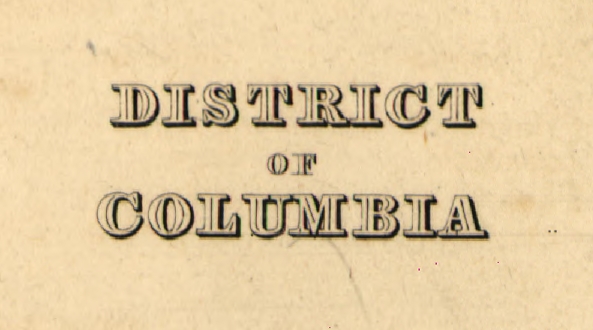 On August 18, District of Columbia Mayor Muriel Bowser returned an unsigned bill to reform the District’s procurement processes signaling that it can become effective without her signature. On August 24, the legislation was sent to Congress for the 30-day congressional review period needed for enactment. The bill will make procedural changes and establish the Office of the Ombudsman for Contracting and Procurement.
On August 18, District of Columbia Mayor Muriel Bowser returned an unsigned bill to reform the District’s procurement processes signaling that it can become effective without her signature. On August 24, the legislation was sent to Congress for the 30-day congressional review period needed for enactment. The bill will make procedural changes and establish the Office of the Ombudsman for Contracting and Procurement.
As introduced, the bill had a pay-to-play provision that banned campaign contributors from bidding on contracts over $100,000 for a year after making a donation to a District candidate. The pay-to-play provision was defeated in a council vote and is not part of the final bill.
State and Federal Communications, Inc. provides research and consulting services for government relations professionals on lobbying laws, procurement lobbying laws, political contribution laws in the United States and Canada. Learn more by visiting stateandfed.com.

